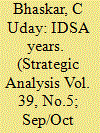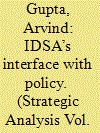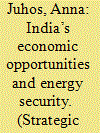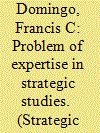|
|
|
Sort Order |
|
|
|
Items / Page
|
|
|
|
|
|
|
| Srl | Item |
| 1 |
ID:
140907


|
|
|
|
|
| Summary/Abstract |
While we celebrate the 25th anniversary of the reunification of Germany and remember more than 25 years of the Peaceful Revolution towards the end that took place in Leipzig and across the German Democratic Republic (GDR), it is also important to turn our attention to the still divided Korean Peninsula, and to maintain the vision of ‘One Korea’. The emphasis should really be on the word ‘vision’. More than 60 years after the devastating Korean War, the Peninsula remains divided and families separated. While people in the south enjoy relative prosperity and freedom, people in the north are oppressed, starving and denied even fundamental human rights. It is important that the world community makes it clear that the people of North Korea are not forgotten. The Cold War is not over on the Korean Peninsula. The fragile Demilitarized Zone is a sad reminder of that reality.
|
|
|
|
|
|
|
|
|
|
|
|
|
|
|
|
| 2 |
ID:
140902


|
|
|
|
|
| Summary/Abstract |
While global governance is all about creating an international order that addresses the interests of the big and small nations and people, non-government and corporate entities, the foreign policy of a state, including its multilateralism, aims at achieving its national interest. Tension between the two therefore is only natural. Often this is depicted as a hiatus between the greater good associated with idealism and self-interest associated with pragmatism. This article argues that the resonance between issues in global governance and issues and postures in India’s multilateralism in the UN suggests that its multilateralism is not completely at odds with the egalitarian aims of global governance. In fact, there are quite a few complementarities and these derive from the fact that although there has been a move towards pragmatism, the shift from idealism has not been complete. However, the complexity of global governance presents some challenges and opportunities for meaningful multilateralism today. Given the complementarities, challenges and opportunities, there is substantial scope for ‘pragmatic activism’ in India’s multilateralism.
|
|
|
|
|
|
|
|
|
|
|
|
|
|
|
|
| 3 |
ID:
140911


|
|
|
|
|
| Summary/Abstract |
It is a privilege to be invited to contribute to the special issue commemorating the 50th anniversary of the IDSA. The institution and the time span are respectively multi-hued and vast and the managing editor has thoughtfully suggested that I dwell on three aspects: my personal association with the institution; its major punctuations and contributions; and the way ahead, as it were—all from my limited perspective.
|
|
|
|
|
|
|
|
|
|
|
|
|
|
|
|
| 4 |
ID:
140913


|
|
|
|
|
| Summary/Abstract |
The Institute for Defence Studies and Analyses (IDSA) can look back at its 50-year journey with satisfaction and pride. Undoubtedly a premier research institution in the country, it occupies a distinctive place in the community of prominent global think tanks as a leading centre for strategic research.
|
|
|
|
|
|
|
|
|
|
|
|
|
|
|
|
| 5 |
ID:
140903


|
|
|
|
|
| Summary/Abstract |
Peace, security and development are inextricably linked. Peaceful, democratic and well-governed societies are believed to promote levels of growth, employment and prosperity. This article first defines the terms peace, security and development and then situates this within a current debate—that of the post-2015 Sustainable Development Goals. It looks at the African Union Post-Conflict Reconstruction and Development (AU PCRD) framework and how it addresses issues of peace, security and development. It examines the African Solidarity Initiative (ASI) and the way this framework addresses these issues. Finally, it discusses the Common African Position (CAP) on the Sustainable Development Goals with particular reference to peace and security.
|
|
|
|
|
|
|
|
|
|
|
|
|
|
|
|
| 6 |
ID:
140899


|
|
|
|
|
| Summary/Abstract |
It has been extensively debated whether India should prioritise relations with its immediate or extended neighbourhood. Put into the framework of energy security and competition with China, it will be argued that the recently signed South Asian Association for Regional Co-operation (SAARC) framework agreement can provide the basis and open up new opportunities for inter- and sub-regional energy co-operation in Asia. Furthermore, besides concrete proposals, such as a two-track process within SAARC, it will also be suggested that in order to successfully extend this framework and tackle the region’s energy dependence, India should embark on the development of triangular foreign policy strategies, connecting Iran, Russia, Japan and the United States with its immediate neighbourhood more significantly.
|
|
|
|
|
|
|
|
|
|
|
|
|
|
|
|
| 7 |
ID:
140904


|
|
|
|
|
| Summary/Abstract |
The realisation that trade and investment are key to development is backed up by development theories and empirical studies. This article identifies existing patterns of trade and investments between India and Africa, whereby Africa has a trade surplus through exports of mostly unprocessed commodities and importing processed merchandise from India. Nevertheless there is scope for Africa to improve domestic business conditions to attract the Indian capital, skills and technology necessary for Africa to process her raw materials before exporting, thus creating more jobs and earning more profit. The Indian government is commended for policies that encourage private sector investments in Africa.
|
|
|
|
|
|
|
|
|
|
|
|
|
|
|
|
| 8 |
ID:
140908


|
|
|
|
|
| Summary/Abstract |
The foreign policy of a state is determined by its domestic policy, the internal balance of power. The domestic political configuration of any state has a predominant role in understanding its foreign political moves. Therefore, an attempt to analyse the orientation of a state’s foreign policy without considering such key factors as its political system, interest groups, intra-elite competition and personal ambitions of its leader and others is not feasible.
|
|
|
|
|
|
|
|
|
|
|
|
|
|
|
|
| 9 |
ID:
140912


|
|
|
|
|
| Summary/Abstract |
This year, the Institute for Defence Studies and Analyses celebrates 50 eventful years of its existence. In my association with the Institute, between 2005 and 2011, an effort was made to strengthen the Institute’s overall capacity to contribute to strategic thinking in India. In this effort, I was ably assisted by the Institute’s scholars and my other colleagues. There was clear emphasis on institution building, rather than individual research efforts. It was felt that enabling a large number of scholars at the IDSA to contribute to strategic thinking more substantially would be a better strategy than focusing on individual performance. This article reflects on this effort and its outcome. It concludes with some suggestions about what can be done to augment this capacity in the future.
|
|
|
|
|
|
|
|
|
|
|
|
|
|
|
|
| 10 |
ID:
140910


|
|
|
|
|
| Summary/Abstract |
Established to fill a gap between policy research and policy innovation, the IDSA is the original gurukul of strategic analyses in modern India. My reminiscences of IDSA in the seventies are a décollage selected to share in a sense of national pride for witnessing some momentous events that became bench marks in shaping India’s defense posture. It (décollage) also expresses professional gratification for being a part of the IDSA faculty with K Subrahmanyam as its Director. All he had to do to be a first responder was to swiftly re-arrange those chromosomes to foresee or react to any threat to India’s national security be it an event or a trend. Subrahmanyam had strategic thinking written into his intellectual DNA. With a seamless logical hook, he could connect doctrines with decision making, or vice versa, to support or question an impending course of action by policy makers. At the same time, his professional etiquette as a bureaucrat allowed him to side-step rather than trip over political protocol.
|
|
|
|
|
|
|
|
|
|
|
|
|
|
|
|
| 11 |
ID:
140906


|
|
|
|
|
| Summary/Abstract |
Strategic geniuses are natural strategic thinkers even without much guidance. While the complexity of strategy makes it extremely difficult to formulate and execute, geniuses like Prussian General Carl von Clausewitz or Chinese General Sun Tzu were successful in developing strategies that are still relevant today. However, as strategic history suggests, military strategists do not need to be geniuses to succeed in creating decisive strategies.1 Strategists only need sufficient expertise to be able to outthink and outmanoeuvre their adversaries. Regrettably, strategic expertise has been elusive because existing strategic education and training has not provided the skills and knowledge that are necessary for developing the potential of future strategists. This problem is manifested by the clear absence of academic literature on strategic education and the unreliable performance of public officials.
|
|
|
|
|
|
|
|
|
|
|
|
|
|
|
|
|
|
|
|
|